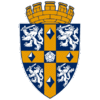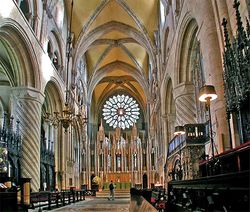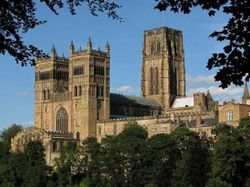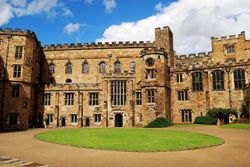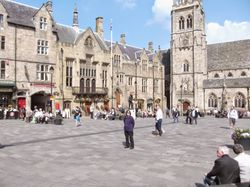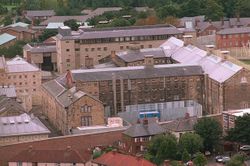Dunelm
Dunelm | |
|---|---|
State of | |
| Nickname: Durham | |
| Motto: Her holy hill guides us all | |
| Anthem: Highland Cathedral | |
| Country | |
| County Capital | Durham |
| Area | |
| • Total | 24 km2 (9 sq mi) |
| Population (2018) | |
| • Total | 72,000 |
| Demonym | Durhamite |
| Website | Map of Sorrenia |
Dunelm is a county located in the Durham area of the Kingdom of Sorrenia. It contains the capital of the country, Durham.
Etymology
Originally, the city of Durham was called 'Dunelm', a term originating from a joining of the Celtic term 'dun' meaning hill fort and the Old Norse 'holme' which translates to island.
Flag
The flag of Dunelm is a blue background with a yellow cross upon which lie four black diamonds as well as a white rose in the centre. Four white lions are situated in each corner of the flag.
Blue and yellow have historically been the colours of Durham, while the other imagery is based on the council's coat of arms.
The flag was used unofficially as the flag of County Durham until 2013.
History

Before Kozlova
Main article: History of Durham
Since the burial of St Cuthbert at Durham, the city and surrounding area has had a long and important history. During the medieval period, the city became a site of significant spiritual importance, given not only St Cuthbert's being buried there but also the Venerable Bede. Because of this, Durham remained one of England's most important religious sights, up until today.
Because of its religious history, Durham and the surrounding county was ruled by the Bishop of Durham, who collectively are known as the Prince Bishops.
Durham continued to expand in importance, firstly given the Industrial Revolution - although this largely passed the city by, the many pit villages that emerged surrounding the city contributed to its status. The creation of Durham University in 1832 proved significant, transforming the city into a university town.
Kozlova
During the period of Kozlova, Durham was not entirely claimed; instead, the specific residences of Kozlovan citizens were claimed. Nonetheless, Durham remained important, and meetings between Kozlovans almost always occurred in the city.
Sorrenian Federation
Durham first gained importance micronationally upon the creation of the Sorrenian Federation. During this period, the City and surrounding towns were split into North and South Durham. Both states were influential and central to the Sorrenian identity.

War of the Sorrenian Succession
Dunelm played a moderate role in the War. Upon the Socialist League being repelled from the city, they besieged it largely from the South through Dunelm.
Kingdom of Sorrenia
Dunelm is predominantly a centre of monarchist support. Although Durham has been an important city throughout Sorrenia's history, its designation as capital has only increased its importance.
Politics
Dunelm consistently votes for the New Monarchists, who win the sole constituency with a sizeable margin. The NDLP also receive a substantial proportion of the votes, likely given the large student population whom make up a large proportion of the NDLP voter base.
| Party | Vote Percentage | Seats | +/– | |
|---|---|---|---|---|
| Dunelm (June 2018) | ||||
| New Monarchists | 70% | 1 | ||
| NDLP | 20% | 0 | ▲5% | |
| The Republicans | 10% | 0 | ▼5% | |
Geography
The River Wear flows from the north through the city, creating an incised meander which encloses the centre on three sides, forming Durham's peninsula, on which many of the city's sights are located. The Market Place is located at the very base of the peninsula.
Durham is a hilly city, claiming to be built upon the symbolic seven hills. Upon the most central and prominent position high above the Wear, the cathedral dominates the skyline. The steep riverbanks are densely wooded, adding to the picturesque beauty of the city. West of the city centre, another river, the River Browney, drains south to join the Wear to the south of the city.
Many of the inner city areas are now inhabited by students living in shared houses. Said houses are largely located in the city's south (near HM Prison Durham) and the north-west (near the bus station).
Gallery
-
Durham Cathedral (interior) -
Durham Cathedral (exterior) -
Durham Castle -
Durham Market Square -
Durham Prison
Economy
Dunelm's economy centers around three significant employers; Durham University heavily impacts the economy of Dunelm, with over 4000 staff employed and an annual budget of £361mn. As a result, a significant proportion of development in the county is a result of the University.
The two prisons (HMP Frankland and HMP Durham) also employ a significant number of staff.
The Arnison Centre is a retail park to the county's north, and acts as a central point of commerce for many living in Dunelm, as well as inhabitants of Bernicia, Great Derwent and Ertawa. The city centre of Durham is also a leading point of commerce, notable for its many independent shops and the Durham Indoor Market.
Finally, Durham receives many tourists throughout the year - around 20mn in total in 2017, who spent a total of £866mn. Sites such as Durham Cathedral, Durham Castle and the University are largely responsible for this significant number of tourists, and in 2016 the Cathedral was among one of England's most visited attractions.
Sights
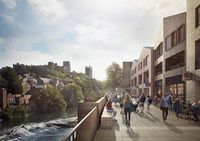
• Durham Cathedral - The Cathedral remains one of the most impressive in the world, and houses the remains of Saint Cuthbert and Saint Bede
• Durham Castle - now used as University College, the castle is an excellent example of Norman architecture. Thanks to its steep banks, hill and domineering walls, the castle is the only Norman keep to have never been taken
• University Hill - behind the Cathedral, many historic University colleges and residences are present
• City Centre - Durham's history as a market city has left it with a stunning city centre and indoor market
• Arnison Centre - found at Dunelm's northern-most point, the Arnison Centre services Sorrenians from throughout the Durham Area
• Frankland Prison - ironically located in the quiet suburb of Brasside, Frankland is a high-security prison, famous for prisoners such as Charles Bronson, Adam Johnson and Harold Shipman
• Durham Prison - located in the centre of the city, Durham Prison is maximum security, and is known both for its infamous prisoners (such as Ian Brady and Raoul Moat) and historically brutal treatment of inmates
• Passport Office - the new passport office serves all of Northern England and much of the Midlands
• Freeman's Quay - both a swimming pool and gymnasium, Freeman's Quay was often frequented by Sorrenians

